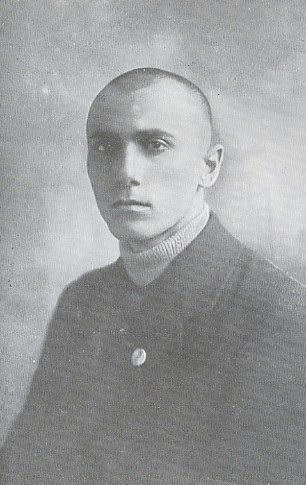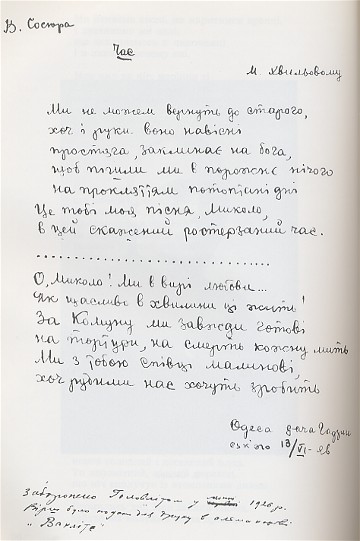Sosiura, Volodymyr
Sosiura, Volodymyr [Sosjura], b 6 January 1898 in Debaltseve, Katerynoslav gubernia, d 8 January 1965 in Kyiv. (Photo: Volodymyr Sosiura.) Poet. During the Ukrainian-Soviet War, 1917–21 he fought in the Army of the Ukrainian National Republic and then in the Red Army. After the war ended, he studied at the Artem Communist University in Kharkiv (1922–3) and at the workers' faculty of the Kharkiv Institute of People's Education (1923–5). He was a member of the literary organizations Pluh, Hart, Vaplite, and the All-Ukrainian Association of Proletarian Writers. His first poem to be published appeared in 1917. His first collection, Poeziï (Poems), published in 1921, was followed by his Romantic revolutionary poem Chervona zyma (The Red Winter, 1922), which was acclaimed as the best example of epic poetry from the period of the struggle for independence (1917–20) in Ukraine, and brought him fame overnight. Sosiura was to write many other works thematically based on that struggle, in which he united intimate, community, and universal concerns, such as in the collections Misto (The City, 1924), Snihy (The Snows, 1925), and Zoloti shuliky (The Golden Hawks, 1927).
His poems, filled with an organic lyricism, leave an impression of sincerity, revolutionary enthusiasm, and passionate feeling. Sosiura drew his unique lyrical style from the wellspring of folk literature. His style leaned toward classically simple verse, a songlike quality, and a Romantic, uplifted mood. Even in his early period Sosiura's poetry reflected his era and its contradictions, such as the impossibility of uniting loyalty to the Bolshevik revolution with feelings of duty toward one's country, a dilemma faced by all the Ukrainian intelligentsia of the 1920s. It can be seen in the poem about internal strife (between communard and nationalist) Dva Volod’ky (The Two Volodias, 1930) and in the collection Sertse (The Heart, 1931), which was banned immediately after its release.
Although Sosiura had been a Party member since 1920, until the early 1930s his poetry brought him into conflict with the Communist party. That, together with the deaths of millions of Ukrainian peasants as a result of the Famine-Genocide of 1932–3 and the persecution and shootings of Ukrainian cultural activists during the 1930s, brought Sosiura near to a mental breakdown. Despite those difficult circumstances he was virtually the only poet in Ukraine in the 1930s who continued to work on lyric love poetry, such as in the collections Chervoni troiandy (Red Roses, 1932), Novi poeziï (New Poems, 1937), Liubliu (I Love, 1939), and Zhuravli pryletily (The Cranes Have Returned, 1940). From 1942 to 1944 Sosiura was a war correspondent. During that period he produced the collections Pid hul kryvavyi (During the Bloody Rumblings of War, 1942) and V hodynu hnivu (In the Hour of Anger, 1942) and the poem ‘Oleh Koshovyi’ (1943), among others. The most noteworthy of his postwar collections are Zelenyi svit (Green World, 1949), Solov'ïni dali (The Nightingale Distances, 1956), and Tak nikhto ne kokhav (No One Has Loved like This, 1960).
An important part of Sosiura's works are his poems written on a grander epic scale, such as the poems ‘1871’ (1923) and ‘Zaliznytsia’ (The Railway, 1924) and the versified novel Taras Triasylo (1926). In 1948 Sosiura was awarded the highest prize at that time, the Stalin Prize, but beginning in 1951 he was again harshly attacked. He was accused of bourgeois nationalism for his patriotic poem ‘Liubit' Ukraïnu’ (Love Ukraine), written in 1944. Although he was productive, Sosiura's poetic achievements were much less than his talents promised. His collected works have been published in 3 volume editions (1929–30 and 1957–8) and in 10 volumes (1970–2). In 1988 the poem ‘Mazepa,’ only excerpts of which had previously been published (1929), and the autobiographical novel Tretia rota (The Third Company) were published.
BIBLIOGRAPHY
Dolengo, O. Tvorchist’ V. Sosiury (Kharkiv 1931)
Stebun, I. Volodymyr Sosiura (Kyiv 1948)
Burliai, Iu. Volodymyr Sosiura: Zhyttia i tvorchist’ (Kyiv 1959)
Kudin, O. Volodymyr Sosiura (Kyiv 1959)
Radchenko, Iu. Volodymyr Sosiura: Literaturno-krytychnyi narys (Kyiv 1967)
Morenets’, V. Volodymyr Sosiura (Kyiv 1990)
Ivan Koshelivets
[This article originally appeared in the Encyclopedia of Ukraine, vol. 4 (1993).]


.jpg)
.jpg)
.jpg)

.jpg)
.jpg)